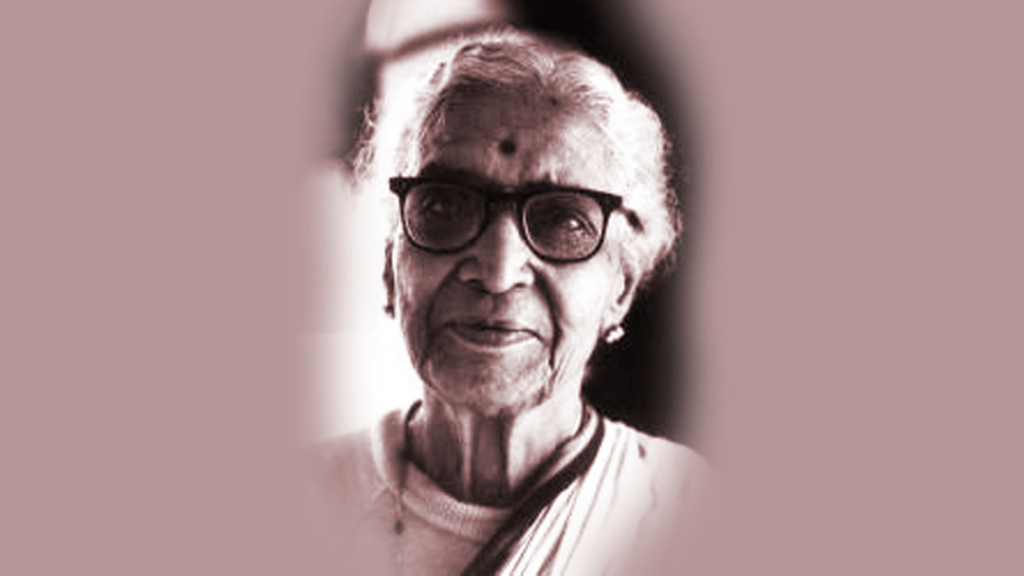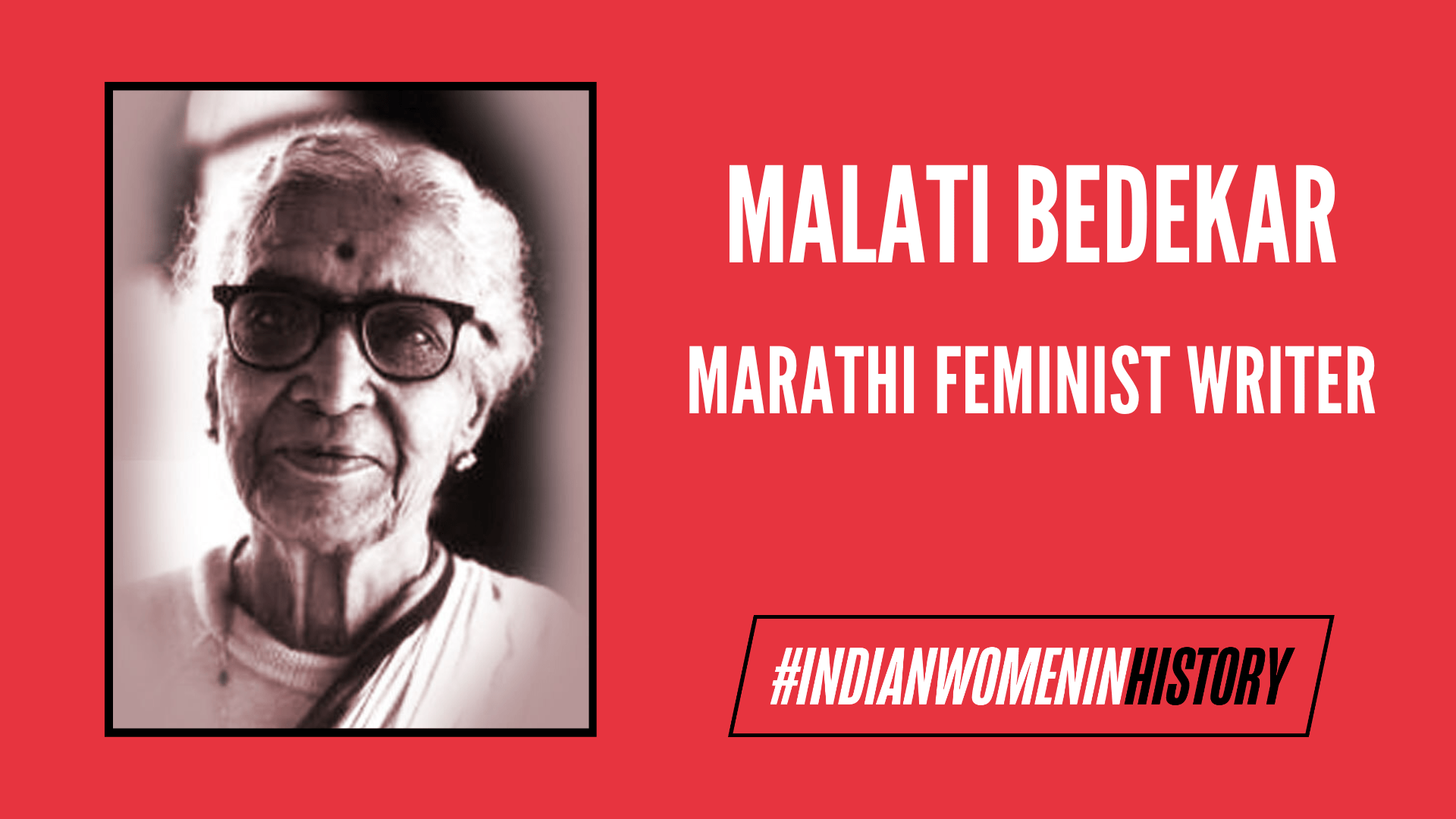Feminist literature has always been fraught with controversy, and declining significance. Yet, works like Vibhavari Shirurkar’s Virlele Swapna (The Dream That Has Faded) provide an invaluably women-centric, South Asian perspective to literature that has largely been monopolised by men.
Who was Vibhavari Shirurkar? It was Malati Bedekar’s pen name. Her female characters, with their multifaceted personalities, complex emotions, and earnest desires, perplexed male writers and critics. The very idea that a story could exist, where the female character was not merely subservient, exploded into the literary arena to both acclaim and proclamations of sheer disdain.

Malati Bhedekar: The woman behind the alias
Malatibai Bedekar was born to a progressive art teacher father, who strongly believed in educating all his children; and a hard-working home maker mother, who also simultaneously managed the family’s dairy farm. Bedekar’s maiden name was Balutai Khare and she grew up in a small rural region of Maharashtra.
Her enrollment into Maharshi Dhondo Keshav Karve’s school for girls, and her subsequent graduation from Bombay’s SNDT University (India’s first university for women, founded by the women’s rights pioneer Karve himself) paved the way for the body of work she would create throughout her life.
Her books also examined the existence of educated women within the family, given her own social position as the second person in her family to have ever graduated. The desires and expectations of such women are impressed upon in her stories with painful, realistic detail through her clear unfettered prose in works like Shabri (1962) and Uma (1966)
These actively feminist influences seeded the first interest in feminist ideologies in young Balutai Khare, as she pursued studies in language and education. Besides her literary career, Malati Bhedekar also got involved in grassroots, and on-the-ground voluntary services and socialist politics. She also worked as a teacher at the SNDT University, and as a government administrator of a “settlement” for certain tribes identified as “criminal” tribes by the British government ruling over India at that time.

Plunging beyond the literary convention
Her upbringing within feminist spaces, inspired Malati Bedekar to create works like Kalyanche Nishwas (1933), a short story collection focused solely on the lives of ordinary women. These stories formed a collection of the experiences she had learnt of, studying amongst widows at her school hostel. Her general writing delved deep into the female experience, highlighting the problems faced by women, particularly those constrained by marital regulations.
Similarly, as the superintendent of her school, Malati Bedekar found insights into the lives of women from different walks of life and socio-economic positions. She truly understood the role of intersectionality in society before the term was even coined.
This led her to also write Hindolyavar (1934), which highlighted a middle-class woman’s desolation at being stuck in a marriage where divorce is not an option; and Virlele Swapna (1935), which discussed the generational influences of Marxist ideologies. In addition, Malati Bedekar’s work experience with the colonial government prompted her to write Bali, one of the first representations of Dalit & tribal communities within Marathi literature, albeit one by an ally.
Also read: K Saraswathi Amma: The Pioneer Of Feminist Literature In Malayalam
Her books also examined the existence of educated women within the family, given her own social position as the second person in her family to have ever graduated. The desires and expectations of such women are impressed upon in her stories with painful, realistic detail through her clear unfettered prose in works like Shabri (1962) and Uma (1966).
Not being one to restrict herself, Malati Bedekar dabbled in playwriting and translation (from English to Marathi), as well. A prominent work of non-fiction by her (also, her last work) is a biography of her father Kharemaster (1993), which provides both an interesting female perspective on paternal feminisms and a poignant portrait of the struggles and successes of progressive men of her time period.

These shattered the literary glass ceiling in the 20th Century Marathi discourse that tended to focus more on the dominant-caste male human condition, neglecting individuality within womanhood and the importance of intersectional social reform.
Feminist literature originally written in vernacular languages is critical to understand the culturally deictic significance of womanhood in socio-linguistics. In order to move away from solely Eurocentric and/or English viewpoints, as literary critics, readers, and consumers of media, we must look towards history and translated works to guide us through future feminist movements
Having introduced conservative Marathi societies to the world through the female gaze, Malati Bedekar sought to include novel representations, with her work featuring sapphic relationships, hetero-platonic relationships, as well as genuinely humane perspectives of tribes who had been legally criminalised under the British Raj. Naturally, no socially-critical writer can pass the critical judgements of their society.
Historical ire and modern-day disregard
Ironically, Malati Bedekar’s work provoked harsh words not just from orthodox, conservative circles, but also from liberal social reformers who lamented that her work did not depict the “progress” they had made. While some were upset over the portrayal of women as a whole, others were upset that her books showcased that women’s issues still persisted. Apparently, some male “allies” have, even in history, fussed when women do not pay their backs.
Thankfully, Malati Bedekar’s pen name protected her from physical harm and insecurity, given that her work quickly received death threats and abuse. Her perseverance through bigoted ignorance to keep writing has gifted us with a treasure trove of feminist perspectives on the 1900s Marathi woman’s life. Yet, it is hard to not notice that her work’s fame has dampened at the turn of the century.

Feminist literature originally written in vernacular languages is critical to understand the culturally deictic significance of womanhood in socio-linguistics. In order to move away from solely Eurocentric and/or English viewpoints, as literary critics, readers, and consumers of media, we must look towards history and translated works to guide us through future feminist movements.
As a translator herself, Malati Bedkar no doubt understood the importance of multilingual navigation through literature. Hence, her legacy leaves us to dutifully remember and preserve our literary heritage and local histories.
So, who was Vibhavari Shirurkar? She was Malati Bedekar, born Balutai Khare. She was a teacher, a PhD awardee in Sanskrit, and a prolifically feminist Marathi writer who wasn’t afraid to step into politics and social work–during a time when bold intersectional feminist movements were just picking up steam.
Also read: Lila Majumdar: Bengal’s Beloved Storyteller | #IndianWomenInHistory
References:
Shirurkar, Vibhavari, and Vibhāvarī Śirūrakara. Kharemaster. Translated by Yashodhara Maitra, Bhatkal & Son, 1998.





Re “the human condition”…
The TRUE human condition, or world we live in, is the history of human madness mainly thanks to the 2 married pink elephants in the room and has never been on clearer display than with the deliberate global Covid Scam atrocity — see “The 2 Married Pink Elephants In The Historical Room –The Holocaustal Covid-19 Coronavirus Madness: A Sociological Perspective & Historical Assessment Of The Covid “Phenomenon”” … https://www.rolf-hefti.com/covid-19-coronavirus.html
(CAVEAT — only read the 2 pink elephant article if you’re GENUINELY interested in the truth and therefore “CAN handle the “inconvenient” truth” …)
“Separate what you know from what you THINK you know.” — Unknown
“2 weeks to flatten the curve has turned into…3 shots to feed your family!” — Unknown